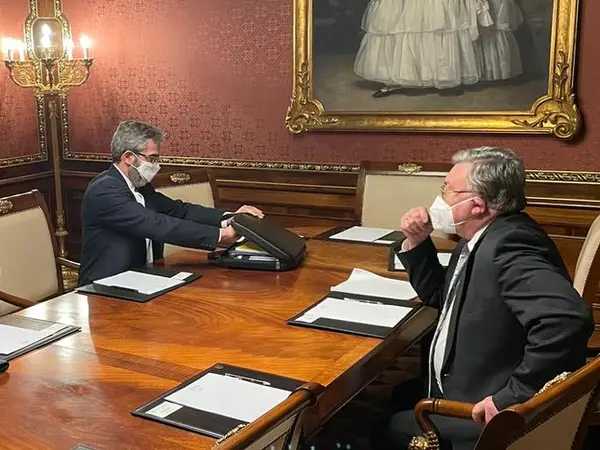Some Iranian observers suggest that the West is not likely to respond to Iran's renewed calls for nuclear talks unless Tehran stops helping Moscow in its war.
At the same time, some US and Iranian officials and commentators are adamant that the JCPOA is dead, while other whisper of an interim agreement.
Newsweek quoted US National Security Council Strategic Communications Coordinator John Kirby as saying last week that "There has been no progress on the Joint Comprehensive Plan of Action (JCPOA), and we are not looking to make progress on the JCPOA anytime in the near future. "Iranian sources also claimed that Kirby said, "The United States is preparing to consider alternative options."
Iran’s hard-line daily Khorasan wrote that there is no hope in the revival of the JCPOA, adding that politicians in the West are interested in some sort of agreement with Tehran about lifting some of the sanctions in exchange for restricting Tehran's nuclear activities. However, sources noted that any miscalculation on either part might change the situation.
In the meantime, if the West does nothing, Iran will get closer to 90-percent Uranium enrichment any moment, Nameh News quoted Western sources.
Long negotiations in Vienna came to a halt in March 2022 when Iranian negotiators returned to Tehran for consultation and almost everyone in the West was hoping to reach an agreement with Tehran soon, but Iran was not forthcoming.
Meanwhile, one month into the war in Ukraine, Russian foreign minister's demand for guarantees from the US that sanctions over Ukraine would not affect its relations with Tehran outraged many in Iran. Lavrov asked for guarantees from the US, at the minimum level of Secretary of State, that US sanctions over Ukraine would not affect Russia's "right to free, fully-fledged trade and economic and investment cooperation and military-technical cooperation with Iran” under the terms of the JCPOA.
Subsequently, several Iranian analysts and opposition politicians blamed Russia for the suspension of the talks in Vienna. One of those commentators was the former chief of the Iranian parliament's National Security and Foreign Relations Committee Heshmatollah Falahatpisheh who accused Russia of following its own interests and damaging Iran's possible benefits in an agreement.
In an interview with Khabar Online published on Sunday, January 29, Falahatpisheh said that he even fears a Russian scenario to start a war between Iran and another country to distract the West from what is happening in Ukraine and reduce pressures on Moscow.
He said no one in the government responded to his suggestions for leaving the Ukraine war in a bid to revive the JCPOA. He added that currently, those who always opposed the West in Tehran are sending messages to the West calling for the revival of the deal but no one in the West seems to be interested.
Falahatpisheh reiterated that Iran's interests may have been sacrificed for the interests of others [Russia].He added that there are looming geopolitical threats against Iran and even Europe has plans against Tehran. He was possibly referring to the idea of listing the IRGC as a terrorist organization.
The former lawmaker, who is traditional conservative critical of hardliners, said that Iran, Europe and the United States had reached a consensus on the text of an agreement before Russia disrupted the talks by demanding guarantees from Washington. Falahatpisheh added that a consensus against Iran would have not been formed in Europe if Tehran had not sent drones to Russia to be used in the war against Ukraine.
It is in this situation that the Financial Times says an interim agreement with Iran could save Tehran from troubles. The FT quoted Ellie Geranmayeh an analyst at the European Council on Foreign Relations as saying "“The Iranians are not pushing for a deal. They understand even if there’s an agreement that provides sanctions relief, it’s going to be minimal, so it’s become even harder for anyone to stick their neck out for a deal.” According to the FT, one option for Iran would be to seek an interim agreement that keeps Tehran's nuclear ambitions under control while at the same time offers limited sanction relief to Tehran.
Under pressures from protests and a chronic economic crisis that has reached its worst stages during the past year, an Iranian government which plans to sell out state assets to make ends meet, might be ready this time to take any agreement that is thrown at it, interim or otherwise.
